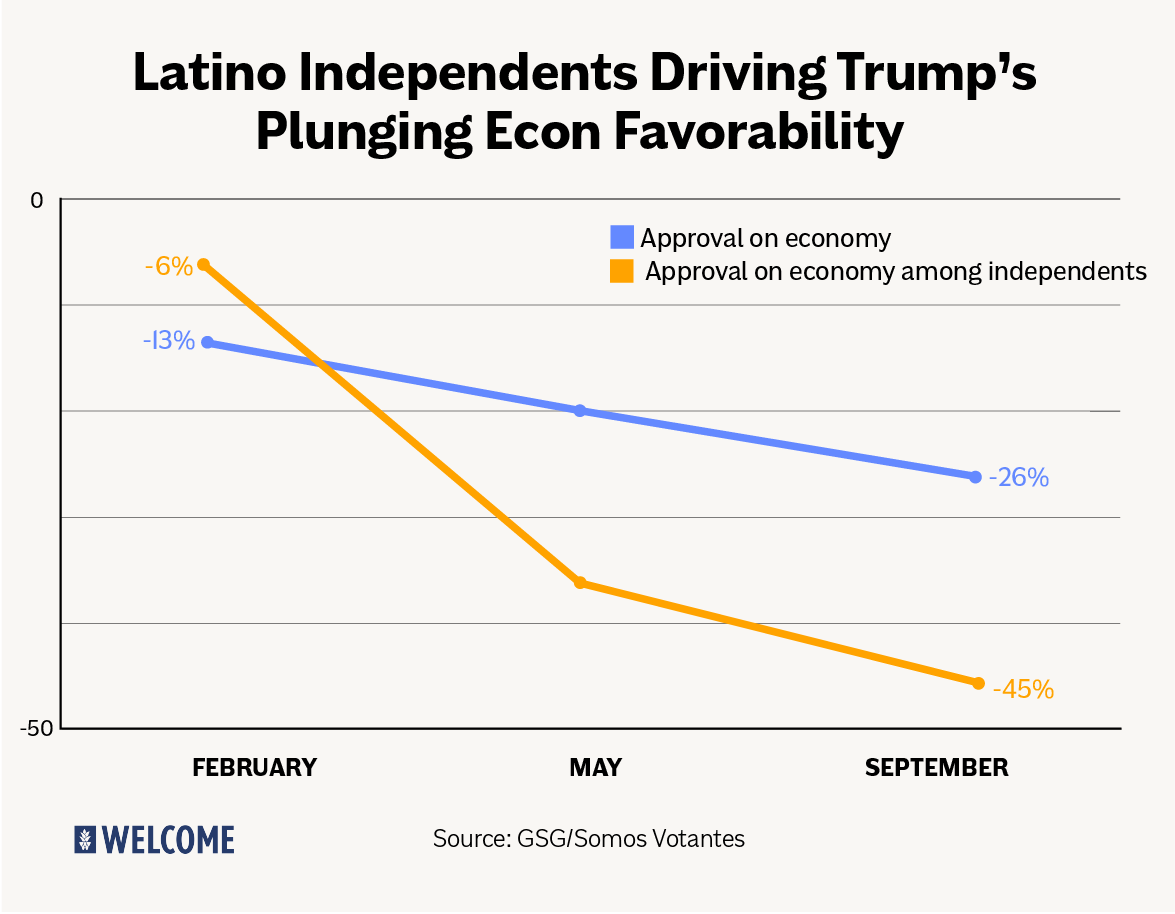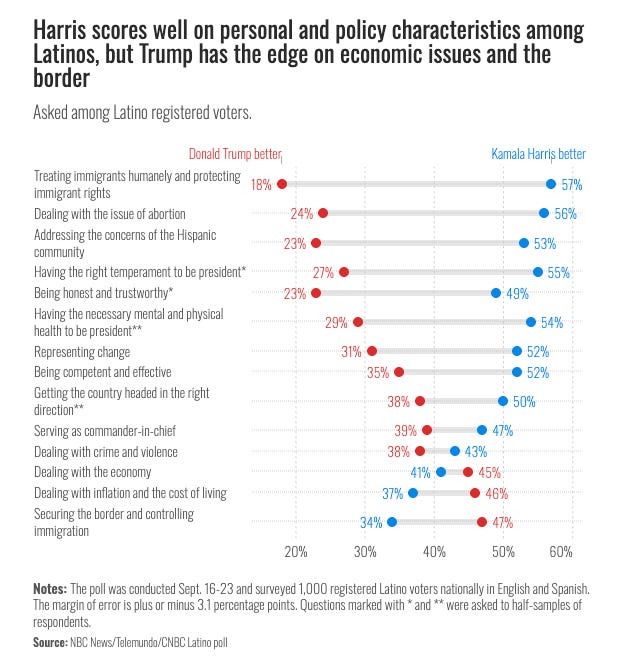Brawl in the Border Districts
Weakening Latino support for Trump puts the GOP's Texas gerrymander at risk of failing
Last week, we covered some worrying polling for Democrats. But let’s be clear - it’s not all bad news. After all, Democrats still lead the generic congressional ballot. Our goal here is to be sober and reality-driven. Last cycle, that approach meant making the case for Democrats to “calmly freak out” more than a year before the election. We were more right about that than we’d like to have been.
One shock in the 2024 election was Trump’s strength with Latinos. And that newfound strength is a key reason why Texas is going back to the redistricting drawing board. Republicans believe they are sufficiently strong with Latinos to stretch out a few more districts in the Rio Grande Valley.
But a new poll shows that assumption may be premature. From Politico:
Trump’s favorability is underwater by 20 points with the demographic, according to a poll obtained by POLITICO and commissioned by the liberal-leaning Latino voter group Somos Votantes.
The shifts among subgroups paint an even starker picture for the GOP: Among men, Trump’s favorability fell from 52 percent in May to 47 percent in September. And with young voters — another segment of Trump's 2024 base — the president’s approval dropped from 43 percent in May to 33 percent in September.
“What began earlier this year with independents and women has really intensified and spread to basically every demographic subset of the Latino electorate, including groups that once leaned toward him like Latino men,” said Melissa Morales, the group’s president, pointing to last quarter’s polling.
The polling shows a steady decline, with Trump’s approval on the economy shifting from -13 to -26. Among Independents, Trump’s economic approval struggled even more, with Latino Independents moving from -6 in February to a jarring -45 in September.
Democrats who win in challenging, heavily-Latino districts tend to be moderate: Henry Cuellar, Vicente Gonzalez, Filemon Vela.
Democrats have struggled with Latino voters because of concerns shared by all voters: about inflation, crime, and border security. Latinos have nuanced views on immigration, trusting Democrats more on immigrant rights and the Latino community, while trusting Trump on the border.
Interestingly, at least one problem Trump may be facing with Latinos is that many did not actually believe he would enact his policies. From a Politico post-mortem:
Carlos Odio, the co-founder of Equis Research (one of the most esteemed Latino polling firms), heard many similar stories in his focus groups. “While in the past immigration was never the number-one issue, it drew a line in the sand — it helped people understand which side, which party, they were on. But Democrats have squandered their advantage on the issue,” Odio told me recently. “They would say, ‘Democrats say they’re going to do all these good things and do none of it; Republicans say they’re going to do all these bad things but don’t actually do them. So why should I vote on this issue at all?’”
And from recent news coverage:
Florida state Sen. Ileana Garcia (R), co-founder of Latinas for Trump, issued a sharp rebuke of President Trump on Sunday as his administration seeks to ramp up deportations and other actions against migrants without legal status.
Garcia took particular issue with reported tactics in southern Florida, where immigration officials have allegedly been making arrests in immigration courts and taking other steps to target individuals otherwise in compliance with legal orders.
“This is not what we voted for,” Garcia wrote in a post on the social platform X. “I have always supported Trump, @realDonaldTrump, through thick and thin. However, this is unacceptable and inhumane.”
“I understand the importance of deporting criminal aliens, but what we are witnessing are arbitrary measures to hunt down people who are complying with their immigration hearings—in many cases, with credible fear of persecution claims—all driven by a Miller-like desire to satisfy a self-fabricated deportation goal,” she continued in her post, referring to White House homeland security adviser and deputy chief of staff Stephen Miller.
Latinos have also long prioritized healthcare and bread-and-butter economic issues. With cuts to Medicaid and the Affordable Care Act and tariffs pushing the economy to recession, Latinos might be open to credibly moderate Democrats. From NBC’s focus groups with Latinos:
But there were cracks, albeit small ones, in support for some of Trump’s specific policies. Two voters who supported Joe Biden in 2020 and flipped to Trump in 2024 said they would not vote for Trump if given the chance to redo their vote, choosing instead to back a third-party candidate.
One of those voters, Ruby L., 59, of Georgia, said she disapproved of Trump’s presidency so far because of potential cuts to programs like Medicaid and because of his approach to deporting undocumented immigrants.
“He was going to deport people that were criminals and have backgrounds,” said Ruby, who was born in Colombia. “But I see that he’s deporting people that work hard and have been in this country. I think he should find a way to help them stay and get a citizenship or something.”
If this shift reverses, there may be some heavily Latino districts that could become unexpectedly competitive. There are currently four seats that are majority Latino where Trump won by 18 points or less.
One of them is California's 22nd district, currently represented by Rep. David Valadao. The district is 69% Latino and voted for Trump by 6 points last year while also sending Valadao back to Congress by 7 points. In 2020, Biden won it by 13 points, which means the district swung to the right by 19 points in just four years, largely due to the gains Trump made with the Latino community. This seat is expected to be one of the most competitive races in the country, and may become even more favorable for Democrats if California redraws their maps ahead of 2026.
There are three additional seats that are currently rated as Likely Republican or Safe Republican by Cook Political Report that could come on to the competitive radar if these trends continue: Florida-27, Texas-15 and Texas-23.
Texas-23 has consistently gone for Trump since 2016 and has been represented by moderate Republican Rep. Tony Gonzales. The district saw minor changes in Texas’ mid-decade redraw, and is now roughly 57% Latino (down from ~64% before the redraw). The current lines have voted for Trump since 2016 (+7 in ‘16 to +15 in ‘24). This district may be tough for Democrats, but Gonzales notably regularly takes heat from the MAGA wing of the party for his moderate stances. Last cycle he was forced into a runoff in the primary, defeating far-right challenger Brandon Herrera by fewer than 400 votes. Herrera is running again, and a far-right nominee may put this seat on the map for Democrats.
Both Florida-27 and Texas-15 have experienced more drastic swings since 2016, again due in part to their large Latino population (74% and 78%, respectively).
Florida-27 is 74% Latino and a district that Trump won by 15 points in 2024. However, he barely eked out a victory there in 2020, winning by just .4 points. It was a different story in 2016, when Clinton soundly defeated Trump by 17 points.
It is a similar story in Texas-15. The recently redrawn seat is still represented by Monica de la Cruz and voted for Trump by 18 points in 2024. However, Trump won it by just 3 points in 2020 and the district actually supported Hillary Clinton by 14 points in 2016. That represents a 32-point swing in just eight years. Earlier this week in Texas-15, Tejano music star Bobby Pulido announced his candidacy with a saying that sounded very similar to us at Welcome “I’m not team red. I’m not team blue. South Texas, I’m team you.”1
In districts that are known for their big swings over short periods of time, and with Trump’s numbers cratering with a demographic that makes up nearly 75% of the district, both Texas-15 and Florida-27 could end up being on the map if Democratic candidates can capitalize on these trends and appeal to voters who have run away from the Democratic Party.





I wonder where they're learning about the Medicaid cuts and deportations of law-abiding folks